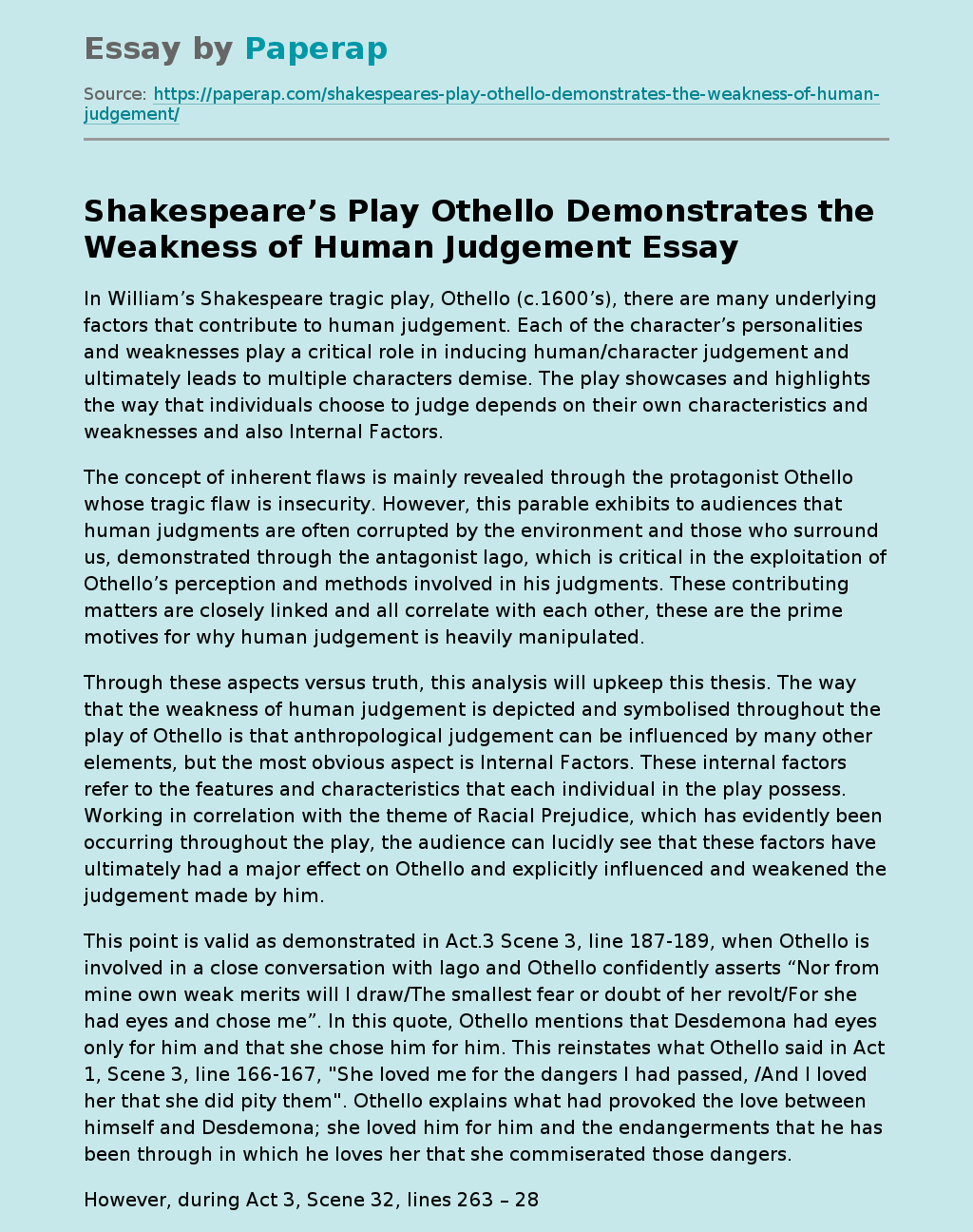Shakespeare’s Play Othello Demonstrates the Weakness of Human Judgement
In William’s Shakespeare tragic play, Othello (c.1600’s), there are many underlying factors that contribute to human judgement. Each of the character’s personalities and weaknesses play a critical role in inducing human/character judgement and ultimately leads to multiple characters demise. The play showcases and highlights the way that individuals choose to judge depends on their own characteristics and weaknesses and also Internal Factors.
The concept of inherent flaws is mainly revealed through the protagonist Othello whose tragic flaw is insecurity.
However, this parable exhibits to audiences that human judgments are often corrupted by the environment and those who surround us, demonstrated through the antagonist Iago, which is critical in the exploitation of Othello’s perception and methods involved in his judgments. These contributing matters are closely linked and all correlate with each other, these are the prime motives for why human judgement is heavily manipulated.
Through these aspects versus truth, this analysis will upkeep this thesis. The way that the weakness of human judgement is depicted and symbolised throughout the play of Othello is that anthropological judgement can be influenced by many other elements, but the most obvious aspect is Internal Factors.
These internal factors refer to the features and characteristics that each individual in the play possess. Working in correlation with the theme of Racial Prejudice, which has evidently been occurring throughout the play, the audience can lucidly see that these factors have ultimately had a major effect on Othello and explicitly influenced and weakened the judgement made by him.
This point is valid as demonstrated in Act.3 Scene 3, line 187-189, when Othello is involved in a close conversation with Iago and Othello confidently asserts “Nor from mine own weak merits will I draw/The smallest fear or doubt of her revolt/For she had eyes and chose me”. In this quote, Othello mentions that Desdemona had eyes only for him and that she chose him for him. This reinstates what Othello said in Act 1, Scene 3, line 166-167, “She loved me for the dangers I had passed, /And I loved her that she did pity them”. Othello explains what had provoked the love between himself and Desdemona; she loved him for him and the endangerments that he has been through in which he loves her that she commiserated those dangers.
However, during Act 3, Scene 32, lines 263 – 282, Othello’s soliloquy reveals the doubts he has on himself, “for I am black”. This soliloquy is a firm confirmation that as a result of racial prejudice, Othello has misjudged Iago’s true character, stating that he is of “exceeding honesty” and that Othello is insecure of himself in regard to Desdemona, believing that she would not love him for the colour he is. We, the audience, can now understand on how racial prejudice and in correspondence with internal factors is involved in influencing characters judgement, specifically Othello evidently seen in Act 3, Scene 3, as it provides us with a soliloquy where Othello exposes his insecurities and that he has mistaken Iago, expressing that he is a honest man. In the play Othello, the theme of Jealousy correlating with Internal Factors has a serious effect on Roderigo and Othello.
Continuously throughout the play, Roderigo is oblivious from realising that he is being manipulated by Iago. Roderigo has so much jealousy for Othello and connecting with the aspiration that he has for Desdemona has ultimately induced his judgement which led to him becoming Iago’s pawn. Iago states to Roderigo that to gain Cassio’s place in Desdemona’s bed, he must kill him.
The idea of killing Cassio is reinforced in the last few lines of Act 4 Scene 3 when Iago tells Cassio, “Come along with me. I’ll give you such reasons for killing him that you’ll feel obliged to snuff him out”. Following these instructions later leads to Roderigo’s demise as Iago is forced, by his belief that he will be a liability, to kill him. Yet, Othello’s jealousy is rather different to Roderigo’s as it changes his behaviour and his actions he chooses to make.
This is as Iago manipulates Othello and we start to see a significant change in his behaviour. Othello starts using much more vulgar terms and accuses Desdemona of being a whore by questioning her in act 4 Scene 2, “Are you not a strumpet?”. After killing Desdemona, Othello realises that he has been manipulated by Iago and transforms back into the noble Othello that we see at the start of the play. As the tragic hero of the play, Othello kills himself, in which we can see that jealousy is what drove him to behave differently, kill Desdemona and kill himself. The play Othello emphasises that weakness of judgement is heavily influenced by jealousy as an individual is shown to become incompetent of reasonable thought.
Shakespeare’s Play Othello Demonstrates the Weakness of Human Judgement. (2021, Feb 19). Retrieved from https://paperap.com/shakespeares-play-othello-demonstrates-the-weakness-of-human-judgement/

